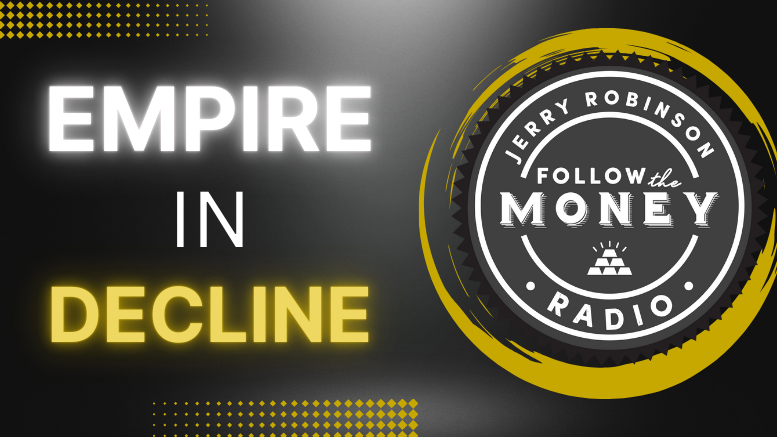by Jerry Robinson | FTMDaily Editor-in-Chief
Today, I bring our discussion of peak oil and the coming breakdown of the petrodollar system to a close.
The threat posed by peak oil to the United States is real and will be devastating without immediate intervention. However, the threat posed by our second issue, the coming breakdown of the petrodollar system, is just as real and is probably more imminent. My basic thesis is that the U.S. is an empire in decline. In the past, it has made some brilliant moves that secured its place as the supreme economic, political, and military leader of the globe. But in its twilight years, America has fallen prey to the common trappings of empire: military overreach, an entitlement mindset, and currency depreciation.
Because America has built its entire financial house atop a massive debt-based system, made possible by the ability to print the world’s reserve currency, it is in America’s national interest to protect the international position of the dollar. And if that means war, so be it. But regardless of your views on the motives behind our recent military incursions, one thing is for certain: The U.S. dollar is in a massive decline and this is severely threatening the existence of the petrodollar system.
A Potential Endgame on the Petrodollar System
So what will happen if the petrodollar system were to break down? Here are a few likely scenarios.
- Because America’s fiat monetary system is debt-based, it requires perpetual growth. The petrodollar system creates a constant source of global demand. Therefore, without this constant and growing global demand for the U.S. dollar, America’s debt-based financial system will break down.
- Without the constant global dollar demand created by the petrodollar system, foreign central banks would lose virtually every reason to view the U.S. dollar as a safe haven. Consequently, dollars held by global central banks, which currently runs in the trillions, could come flooding back to America’s shores causing massive inflation.
- In an effort to control the rampant inflation created by this flood of dollars, the Federal Reserve would be forced to sop up the excess liquidity by drastically increasing interest rates – quite possibly to double digits.
- Higher interest rates would destroy the fragile U.S. economy, perpetuate the ongoing housing crisis, and bring U.S. consumption to a standstill.
- In the end, the U.S. dollar would lose its position as the key reserve currency which would bring our debt-based monetary system to a final day of reckoning.
But some may object: “How is this even possible? The dollar is irreplaceable on the global markets, isn’t it?” It is true that the dollar has reigned supreme as the world’s reserve currency for decades, and that it has gained the trust of central banks around the world. However, unlike decades past, the dollar is no longer the only possible currency that could hold the title as the key reserve currency. But what other currency could possibly challenge the power of the almighty U.S. dollar? After all, Europe is on the rocks, and China is not ready to carry the torch.
Since 1971, the globe has been experimenting with its first completely fiat paper monetary system. The result? Many are now losing faith in paper currencies. In order to restore trust and confidence in the global financial system, it is highly likely that the monetary authorities will need to return to some form of commodity-backed currency system. The most likely candidate for this backing would be gold, as it has been perceived and used as money for millenia.
Is it possible that the petrodollar system can be salvaged so that a massive dollar crisis can be averted? Here the answer is a clear no. As a fiat debt-based monetary system, the U.S. dollar is doomed to the dust bin of history just like every fiat currency before it. Because the dollar is debt-based, it simply cannot survive in a period of declining production and limited growth. This fatal flaw in America’s economy will be examined and exposed in the next section. Topics will include America’s addiction to consumer debt, the sub-prime mortgage crisis, America’s recent bailout efforts, and finally, how the creation of the Federal Reserve has led to the demise of the American experiment.
A Final Word on Peak Oil
Can peak oil be averted? Yes… and no.
Let me explain.
The first answer is no, because peak oil is an inevitable phenomenon due to the finite supply of petroleum within the earth.
However, the answer is also yes, because the effects of peak oil can be averted if America, and the world, can develop a viable energy strategy to systematically wean the public off of petroleum-based energy supplies.
The hard reality is that America has built an extremely advanced economy that requires cheap and plentiful petroleum supplies. The problem remains that, as global oil supplies continue to decline, these supplies will neither be cheap, nor plentiful. Instead, global oil supplies will become increasingly expensive and in limited supply.
Faced with the threat, many have sought an easy answer by pointing to America’s continental shelf, ANWR, and even oil shale and oil sands. While all of these are good ideas, the real problem lies in the required costs and lead time that is needed to make these strategies viable long-term strategies.
Likewise, alternative energy sources, like natural gas, offer a step in the right direction but would require a massive overhaul of the entire infrastructure.
In the end, no one can really know for a certainty when any of these things will occur. While the basic laws of economics and science tell us that these events are nearly certain, when they will happen is the million-dollar question. And quite frankly, my hope is that it happens decades from now. The calamity that peak oil and the breakdown of the petrodollar system will bring to America is not something that any sane person would desire. However, the data is clear and, as I have said before, facts are stubborn things. Wishing that these facts will go away will not make them disappear.
Ultimately, my goal for you is that you would be forewarned and prepared.
Here at FTMDaily.com, we are working hard to create solutions for you during these difficult times of economic crisis. We invite your feedback and comments on how we may serve you better. Feel free to contact me directly at jerry@ftmdaily.com.
In The News Today…
1. FED WATCH: As investors await the release of the minutes from the Federal Reserve’s policy-setting meeting last month, U.S. Treasury prices turned down Wednesday, pushing benchmark 10-year yields up slightly from five-month lows. Commodities also moved higher.
2. MARKET WATCH: Strong earnings from computer maker Dell lifted stock markets Wednesday but sentiment across markets has been fragile of late with investors worried about a slowdown in the global economy. Weak U.S. industrial production and housing figures this week are not helping…
3. OIL WATCH: The nation’s oil supplies were flat last week at 370.3 million barrels and gasoline supplies rose by 100,000 barrels to 205.9 million barrels, the government said Wednesday. Oil prices are now back above $100 per barrel.
4. POSTAL BAILOUT: The U.S. Postal Service will begin to default on its financial obligations just over four months from now unless Congress takes action to relieve it of its obligation to pre-fund retiree health care accounts, its leader told lawmakers Tuesday. With its $15 billion debt limit due to be reached this year, more borrowing is not an option.
5. ALL THE GOLD AT FT. KNOX: The next big question on the federal debt limit could be whether to start selling the government’s holdings of gold at Fort Knox — and at least one presidential contender, Ron Paul, has told The New York Sun he thinks it would be a good move.
Finally…
Just a reminder of how completely out of control the Federal government is…
Leroy Fick of Bay County, Michigan won $2 million in the lottery last year and recently admitted to still using food stamps. According to Fick, the Department of Human Services told him he could continue to use his food stamps, which are paid for with tax dollars, despite his lottery winnings.
Until tomorrow,
Jerry Robinson – FTMDaily.com






